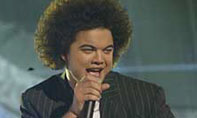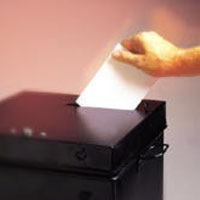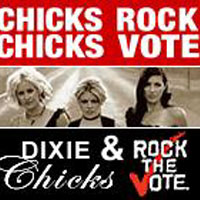- About Us
- Columns
- Letters
- Cartoons
- The Udder Limits
- Archives
- Ezy Reading Archive
- 2024 Cud Archives
- 2023 Cud Archives
- 2022 Cud Archives
- 2021 Cud Archives
- 2020 Cud Archives
- 2015-2019
- 2010-2014
- 2004-2009
 |
(Dec 2004) The Harsh Reality of Politics |
What's this I hear about rising voter apathy? Without pretending to be an expert on political statistics I can pick a brazen untruth when one yells down my ear hole.
People -and young people in particular- love to vote: the evidence is irrefutable.
Australia's recent election was nothing if not a political orgasm laid bare, the electric build-up of friction between the two major parties culminating in a gripping crescendo of noise and fireworks. We waited as one sweaty nation for the moment of truth, and when it came (if you'll pardon pun) the news flash-flooded the streets. Yes, contrary to much popular and media speculation, Casey had been elected the new Australian Idol.
This voting frenzy was by no means a freak phenomenon. Nearly three million people tuned into the final episode of the latest Big Brother - the fourth in its series - making it the most watched single episode in pre-Idol Australia this year. In fact, of that Top Ten list, six of those episodes were interactive reality TV shows. Three of them were American crime shows and one of them, coming home in sixth place, was a news programme.
Voting has become an increasingly essential ingredient in the recipe for lucrative mass entertainment, though admittedly it is hard to imagine John Howard and Mark Latham inspiring the same level of enthusiasm as our beloved teenage crooners. Even if federal SMS votes were accepted it is unlikely that we would bother thumbing in our opinion thirty times a week. So where are the pollies going wrong?
 The uncomfortable relationship between politics and reality TV first hit the headlines in the UK just after the national election of 2001, when an embarrassed number'cruncher admitted that more Brits voted for who should stay in the Big Brother house than for who should sit in the House of Commons. (Significantly, perhaps, the winner of the Big Brother election stood to win 70,000 Stirling ' considerably more than the annual salary of the Prime Minister.) That year the issue of national government attracted less than 60% of eligible voters to the polls ' a record low since 1918. Voter participation in reality TV shows simultaneously reached an all'time record high.
The uncomfortable relationship between politics and reality TV first hit the headlines in the UK just after the national election of 2001, when an embarrassed number'cruncher admitted that more Brits voted for who should stay in the Big Brother house than for who should sit in the House of Commons. (Significantly, perhaps, the winner of the Big Brother election stood to win 70,000 Stirling ' considerably more than the annual salary of the Prime Minister.) That year the issue of national government attracted less than 60% of eligible voters to the polls ' a record low since 1918. Voter participation in reality TV shows simultaneously reached an all'time record high.
British politicians have not been the only losers in the ratings popularity contest. The Czech government has recently disbanded, largely due to the fact that the ruling party took a beating in the EU elections - for which there was a (not quite) 30% turnout. That's about 2.3 million voters, to be specific. Put in perspective, more than 3 million people registered their votes in Cesko hleda SuperStar... yes, that's Czechoslovakian Idol to you and me.
At this juncture it is obviously tempting to offer political hopefuls some glib advice about the need for more hairspray, spandex and a hit 70s cover song in their repertoire to improve their career prospects, but unfortunately the concept has already been optioned. Vote For Me is the British politician's reality spin off of I'm A Celebrity Get Me Out Of Here ' essentially a forum for half-remembered'once'kind'of'famous people to slate/shag someone equally unmemorable in public in an attempt to stimulate receding incomes. However, doubt has been preemptively cast over the show by its late-night timeslot, a thinly disguised executive vote of no confidence in the allure of politicians for the mainstream audience.
Television producers in the States had a little more confidence in the general idea, however, with the launch of American President hitting primetime in August this year. Interestingly, the television audience was not invited to vote: it was the 'presidential candidates' themselves who voted each other out of the contest, supposedly based upon the merits (or otherwise) or their respective campaigns. The result, of course, was a show about political infighting, conspiracies and double'crossing, bringing some 'reality' back into reality TV.
The movers and shakers of the political world have apparently been taking notes. After all, this global television phenomenon has quickly succeeded where many Western national elections have failed: actually getting the public to vote. Arguably, one of the most intelligent aspects of this year's federally recognized US presidential campaign was the broadcast emphasis on Idol and Big Brotheresque production values: the increased obsession with live footage (naturally with extra behind-the-scenes surveillance); the helpful addition of subtitling and of course an even bigger, better and more drawn out series of challenges interspersed with carefully choreographed song and dance routines. All that was missing was Simon Cowell to adjudicate the presidential debate... now there was a missed opportunity!
 Notably, Election Day (or more accurately, Election Season) 2004 topped the polls in the US, a reversal of the declining trend (particularly in the youngest demographic) of recent decades. And still, the electoral organizers in other nations are scratching their beards in envious puzzlement... Why are punters so keen to vote on the next warbling starlet, yet so reluctant to vote on their next national leader? Given that one vote will affect the charts for about four weeks and the other will have international ramifications for at least four years, it does appear to laugh in the face of logic.
Notably, Election Day (or more accurately, Election Season) 2004 topped the polls in the US, a reversal of the declining trend (particularly in the youngest demographic) of recent decades. And still, the electoral organizers in other nations are scratching their beards in envious puzzlement... Why are punters so keen to vote on the next warbling starlet, yet so reluctant to vote on their next national leader? Given that one vote will affect the charts for about four weeks and the other will have international ramifications for at least four years, it does appear to laugh in the face of logic.
The answer to this conundrum might lie not in what the vote actually does, but whether it does anything at all. We no longer live in the sixties: ours is not an age where public opinion affects public policy. When more than a million people marched in London against joining the military coalition against Iraq, the British government managed not only to ignore this overwhelming communal response but also to emerge politically unscathed, claiming the ethical high ground. If governments aren't listening to their electorates, to whom are they listening? Evidently the great unwashed are well aware their view counts for nothing against the judgment passed down by British Petroleum and other big businesses that are consulted in decision'making processes: a post'election survey in 2001 reported that 77% of Britons did not believe voting changed a thing.
But the Idol audience has real power and they know it - because they see their vote in motion. Week by week the field of contestants is refined until the winner is... And here is a key point of departure from politics: the element of choice. With reality TV the voters are spoilt rotten for choice; in national elections the 'choice' seems increasingly limited to two.
If your average consumer walked into a bar to be offered only two brands of beer and nothing else, they would most likely feel disappointed. If they happened to actively dislike the only beers available they would probably refuse to buy either and have words with the barman. If the barman then told them that it was obligatory to buy one of the two beers, the consumer's only remaining choice would then be whether to throw up in the glass or on the carpet. Thus, even where voting is mandatory as it is in Australia, a good turnout at the polls does not necessarily reflect a politically engaged and empowered electorate.
Faced with such a limited choice on Election Day, people are more likely to vote negatively; in other words they will vote against the person they don't want for the job rather than voting for their ideal candidate (if this dubious person exists). TV audiences, on the other hand, having a much broader range of options, are more likely to vote positively. Involving the audience at an early stage of the process appears to give them a greater sense of ownership and control ' qualities that are lacking in the political process.
Should our politicians be masturbating boars and swimming through tanks of baby crocodiles in pursuit of an interested audience, then? These, after all, are the techniques used by many successful reality TV shows. But just when we thought the reality antics could become no more extreme, the Spaniards have raised the stakes.
The seven remaining contestants in Spain's Big Brother house have now to face the most daunting challenge yet. They have been given five days to memorize all 325 pages of the European Constitution ' possibly the least riveting read of all time. This is not merely a sadistic whim of the producers; it is a carefully constructed stunt to publicise its contents before a referendum is held in February. The Spanish will be the first Europeans to vote on this Constitution, and a dancer, a taxi driver and a make'up saleswoman are amongst those chosen to popularise serious politics.
So, when governments can learn to do the job they've supposedly been elected for, the public may well be sufficiently inspired to get up off the sofa and vote. Until that point, however, wise politicians should be reaching for those spandex pants and rehearsing a little bum dance in preparation for the next parliamentary debate. And make it legal for us to vote by SMS.
